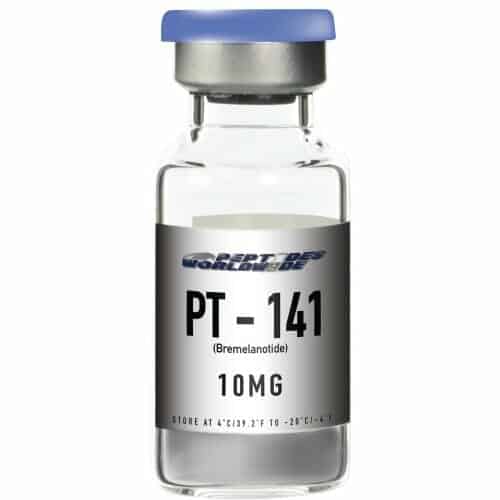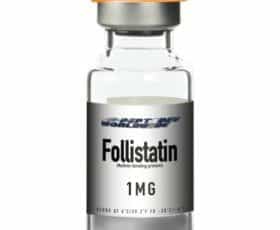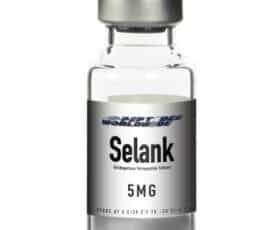Description
Scientific Name: (Bremelanotide)
Clinical Test Expectation: Aphrodisiac
MG Strength: 10mg per vial
Detailed Product Information
Scientists have developed a drug which could boost female sexual desire. Tests in female rats are proving promising, showing “significantly enhanced” sexual behaviour. Its developers believe it could be a more significant development in the treatment of sexual dysfunction than Viagra. If human trials do prove successful, it could be on the market within three years.The drug, PT141, is being developed by researchers at Concordia University, Montreal, Canada and Palatin Technologies – the company which is developing it.
PT141 seems to encourage the female rats to actively seek out the males for sex, which in turn heightens their sexual arousal. The drug, which comes in the form of a nasal spray, has a virtually instantaneous effect.
The company is carrying out tests to see if the drug benefits women who have normal sexual function. A study involving men with erectile dysfunction is also underway. Experts in the UK stress research into the drug is still at a very early stage, but say it is hopeful. Currently, the only help available for women with sexual dysfunction problems is psychological or sexual therapy.
Promising
PT141 is a copy of a hormone which has an effect on the nervous system called alpha-melanocyte-stimulating hormone. It has been established that melanocyte-receptors in the brain play a part in several behaviours including sexual arousal. So stimulating these receptors using PT141 may stimulate sexual function. A study of around 40 female rats showed a three- to five-fold increase in solicitations in rats who were given the drug compared to those which were not. Jim Pfaus, professor of psychology at Concordia University, is carrying out the research into PT141’s effects on female rats, and he told BBC News Online: “It could be bigger than Viagra.”
“There’s nothing in the arsenal now to treat female sexual dysfunction. That’s one of the things that’s really promising about this drug.
“If you have a woman in a loving relationship, but who just doesn’t feel desire for sex, the question is why. What goes on to inhibit that?”
He said it could be that there was an interruption in the “chain of command” within the body which leads to desiring sex.
Potential benefits
This drug may be able to “jump-start” the connection that has failed, and the brain may re-learn the normal arousal response.
He said: “It only affected solicitation. It didn’t affect the ability to copulate or the rate of copulation.”
Professor Pfaus accepts there is a long way to go before the potential benefits can be confirmed, but he said the history of research using male rats was encouraging.
“We know of a good correlation between male rats and male humans.”
But he said it was not yet known if female rats and humans were as similar.
Further research will look at whether repeated use of the drug reduces its effectiveness.
Dr Annette Shadiack, director of biological research for Palatin, said: “This has the potential to really meet an unmet need.
She added that the research was aimed creating a treatment which could “return a woman to her natural function.”
Lack of treatments
Dr Selim Cellek, a senior research fellow in sexual dysfunction at the Wolfson Institute for Biomedical Research at University College London, said of the PT141 research: “This is hopeful, it might work, but there needs to be more research.
“It’s acting on the brain, and we don’t know much about how female sexual behaviour is regulated in the brain.”
Dr Cellek said there was currently no drug treatment available for female sexual dysfunction.
He added that the research into PT141 could help understanding of female sexual arousal: “If you don’t know how the machine works, you can’t fix it when it doesn’t.”
Amino acid sequence: Ac-Nle-cyclo[Asp-His-D-Phe-Arg-Trp-Lys]-OH or cyclo-[Nle4, Asp5, D-Phe7, Lys10]alpha-MSH-(4-10). Formula C50H68N14O10 Mol. mass 1025.2 g/mol Half-life 120 minutes Peptide
Appearance: Sterile Filtered White lyophilized (freeze-dried) powder. PT-141, also known as bremelanotide is a melanocortin (a group of pituitary peptide hormones). More specifically bremelanotide (PT-141) is a cyclic hepta-peptide lactam analog of alpha-melanocyte-stimulating hormone (alpha-MSH) that activates the melanocortin receptors MC3-R and MC4-R in the central nervous system. It is a metabolite of Melanotan II that lacks the function of the C-terminal amide.
In 2008 studies were done and published regarding the relationships between the central nervous system (CNS) and the role of neurotransmitters resulting in effects in genitalia: The role of CNS-acting compounds such as dopamine agonists in the treatment of male sexual dysfunction is under active investigation. Melanocortins have CNS and peripheral roles in a wide variety of bodily functions. The melanocortin agonist bremelanotide appears to act in the CNS to promote erections in preclinical models, and may also stimulate behaviors that facilitate sexual activity beyond their erectogenic effects.
[1] Another study from 2008 evaluates the efficacy of bremelanotide in men with erectile dysfunction who were not responders to therapy with sildenafil. The findings were that over 33% of men with ED who did not respond to sildenafil did have a positive response to bremelanotide: A total of 342 married men (28 to 59 years old) with erectile dysfunction who did not respond to sildenafil were randomly assigned to receive 10 mg PT-141 bremelanotide as an intranasal spray (group 1, 172) 45 minutes to 2 hours prior to sexual stimulation, or a similar regimen of placebo (group 2, 170).
Patients were asked to use at least 16 doses/attempts at home. They underwent preliminary assessment, including medical and sexual history, and self-administered International Index of Erectile Function. The efficacy of 2 treatments was assessed every 4 attempts during treatment and at the end of study, using responses to International Index of Erectile Function, and evaluation of mean intercourse satisfaction domain, mean weekly coitus episodes and adverse drug effects. Positive clinical results were seen in 51 (33.5%) patients in the bremelanotide group compared with 13 (8.5%) patients in the placebo group (p = 0.03). Patients in the bremelanotide group reported significantly greater intercourse satisfaction than those in placebo group (p = 0.03). Bremelanotide could possibly be researched further as an alternative treatment for erectile dysfunction with a potentially broad patient base. Further studies with different dosages and treatment regimens are necessary to draw final conclusions on the efficacy of this drug in erectile dysfunction.
[2] Studies have also been conducted concerning female’s libido and reactions to PT-141 bremelanotide. Sexual arousal disorder (SAD) affects about 30% of women worldwide and there are no effective drug treatments for the disorder. A study printed in the Journal of Sexual Medicine in 2008 found PT-141 to be an effective treatment: A total of 80 married women (mean age 31 years) with FSAD were randomly assigned to receive 20-mg bremelanotide as an intranasal spray (group 1, N = 40) on “as required” basis 45-60 minutes before attempting sexual intercourse, or a similar regimen of placebo (group 2, N = 40). The patients were asked to use at least 20 attempts at home. They underwent preliminary assessment, including medical and sexual history, blood chemistry, measurement of serum levels of sex hormones and prolactin, and self-administered Female Sexual Function Index (FSFI). The efficacy of the two treatments was assessed every four attempts during treatment and at the end of study, using responses to FSFI and evaluation of total number of sexual events, total number of orgasm, personal distress, and adverse drug effects.
Results: Mean pretreatment arousal score of 2.7 and 2.8 in groups 1 and 2 increased to 4.1 and 3.0, respectively, at the end of the trial (P = 0.001). The bremelanotide group reported significantly greater intercourse satisfaction than those in the placebo group (P = 0.001). More drug-related adverse effects occurred in the bremelanotide group and two (5%) had to discontinue treatment (P = 0.01).
[3] Generally, medical study grade peptides are used for these tests. This correlates to 95% purity or better. Testing with research items with lower purity would not yield the same test results.
Reconstitution : As a general procedure, the manufacturer recommends reconstituting PT-141 peptides in sterile, distilled water, with light sonication if necessary. PT-141 peptides are available for research purposes only.
Mixing and our recommended dosage
You inject 2ml water into the vial of PT141 from the watervial. 1 full syringe is 1ml. you then wait for the vial powder content to dissolve and once dissolved and clear you draw out 0.1 – 0.2 (100 to 200 mcg) on the syringe 1 hour before activity. Inject it into the tummy under the skin into the fatty skin layer







Reviews
There are no reviews yet.